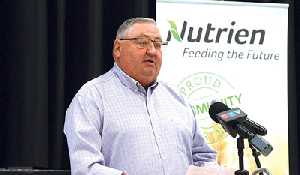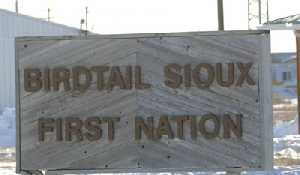APAS says shipping delays cap off a tough year
December 2, 2021, 11:49 am
Sierra D'Souza Butts, Local Journalism Initiative Reporter


With the recent heavy rainfall in B.C., the Agricultural Producers Association of Saskatchewan (APAS) speaks about what their plans are in supporting farmers in the province during these tough times.
APAS’ president Todd Lewis, speaks about what farmers should expect during the delays of grain transportation across the country.
What are the immediate impacts on the Prairie commodities in the market, based on the infrastructure closures in B.C.?
“Well we really have to see how it’s going to affect the market, we’re expecting some delays in shipping of course. The number of days it has been delayed always works it’s way back to the farm gate. I think we’re at the stage now where it’s not something that can’t be overcome, if they’re able to resume as quickly as possible, hopefully repairs will be made in a safe and sound manner.
“The wild card in all of this is seeing more weather related events, there’s talk about more rain on the coast for the next number of days and of course we are going into the winter period, the weather is always unpredictable around the winter time too. It’s not unusual to have shipping delays in the winter but really some of the damage to the track and to the infrastructure is unprecedented. Of course we are hoping the repairs will keep gong on as well as they have, and that we’ll see some resumption in service this week some time.”
How have the CP rail and CN rail, informed you about how this will impact grain shipments?
“We’ve been following what’s been on the news, there have been a couple of government calls over the last week and so. We know the CN and CP are doing their best, it’s their business to ensure that the train gets up and running as quickly as possible. We’re satisfied that these are amazing jobs that they are doing, as far as engineering and the jobs trying to get product the places that have been moshed out. There’s lots of issues as far as maintenance repairs, you know we trust the railroads to our best and of course, the safety of the workers who are trying to do these repairs, we just wish everyone well. We’re satisfied, I think our producers are satisfied, an are being patient and just hoping for the best.”
Do you have an idea of how long this impact will affect shipments of grain?
“Not yet, to be fair we’ll see that as we go forward, particularly over the Christmas season is a little bit of a slower pace with grain shipments and we really don’t see that changing much. After these repairs have been made, the system is going to take a while to get back, it’s a big complicated system and it’s going to take a while to get up to speed. We expect to see service restored as quickly as possible and resume to normal as quickly as possible, but it’s going to take a while to get there and we understand that. We just hope that these repairs get made and do their best to get back to normal shipping, as soon as possible.”
Aside from this recent issue, are shipments of grain a concern?
“I think the shipping season you know as we go forward, there’s less crops to ship this year of course because of the drought. We want to ensure there’s enough engine power there too to ensure this year’s crop. Of course we’re simply hoping to see labor and equipment maintained to a level that we’re able to ship the crops in a timely fashion, really the whole shipping system is under stress coming out from Covid. There’s been lots of backlogs. Grains are no different, we certainly hope to see shipping get back to normal sooner than later. We’ll be keeping a close eye over the winter Winter.”
In your opinion, does the federal or provincial government have a grain strategy for farmers in Saskatchewan?
“They certainly do, the provinces and the federal government. The federal government are the regulators of the railroads, we only have two railroads operating in this country, ut’s a duopoly. The minister of transport as well, the Canadian Rail Transportation (CRT), they all work together. There’s also collaborations for disasters like this, there’s the government in B.C. as well.”
“I think governments want to see grains move as well, it’s an important part of the Canadian economy, not just Western Canada, not just Saskatchewan but a huge part of our trade balance with our trading partners. It’s important that we see grain move and I think we’ll see the government step up as well to do their best to ensure we get through this difficult period.”
In the long run, what needs to change to ensure Prairie commodities can get to the market on time?
Well CP and CN rail both have winter grain movement plans and I think we need to see those plans being robust. That when the plans are put in place, the shipping schedule that is within those plans, if some of those plans don’t occur we need to see why they didn’t happen and just understand some of the problems that can arise. Over time we understand better when the railroads have problems, that these problems are recognized and alleviated as quickly as possible.”
“This particular issue now with the heavy rain fall and the damages that arose, nobody can foresee that kind of damage and that kind of storm. But at the same time, as we come out of this and we hope to see collaboration between railroads, and shippers as well, the railroads, you know to ship product - to use other routes. Through the United States for example and up to our northern import of Prince Rupert so to see grain move in a timely fashion i think we need some out of the box thinking perhaps because we see more damage from delays. It really is important that this year’s crops get to our customers because Canada has a reputation of being a reliable source of product or international customers, it’s important to maintain that reputation.”
In general, how big of an issue is transportation?
“Well some years in the past we’ve had some terrible shipping years, its cost farmers billions in the past but you know all we can do is keep moving forward. It is a evolving industry and situation, so things like this weather situation, sure hasn’t helped things but that’s the whole part of trying to move grain in a country as big as Canada. With the weather and large distances, it has to be covered but the industry is resilient and the railroads are resilient, you know hopefully we get through this just like we have with other crises, and to continue to see improvements to see grain move. We have an increase in volumes within the radar this year with the lower productions, but over the last decade we’ve seen a huge increase in volumes and we’ll continue to. We’re just hoping that we continue to see par with the railroads, and it’s a big part of their business, grain movement. For the entire economy it’s a down, it’s not just the grain system, it’s a huge part of the economy. The port of Vancouver for instance is the main economic driver activity in the lower mainland, and grain moving through that port is very important.”
With all things considered this year, what kind of year has it been for agriculture in Saskatchewan?
“It’s been troublesome, without a doubt the drought has put lots of pressure on the livestock industry and grain producers. I think the silver lining has been in the grain side, on the side of the commodity prices, the increase in them as pushed it low to a point, but the shortage of seed and water in some cases, has been very difficult on the livestock sector like the cattle, the cattle sector in particular. Really it’s affected all of agriculture, we have seen lower crop production of course and that affects producers, bottom lines. It has been a difficult year and really a lot of concern going into next spring, we need to see some significant soil and moisture, especially in the Western side of the province now. Going into the next spring as well, increased fertilizer pricing and input of crops, we’ll be talking more and more about that as the spring comes up. It’s been a difficult year unfortunately, but we’ll make it through this last year, especially on the livestock side and the reduction of herd. We’re just hoping we can produce stock, as much bringing stock as possible that can be maintained so we can get through this bad year that we just had.”
“Farmers’ mental health is always important, if farmers are feeling the pressure, talk to your financial institutions, communication is going to be the key. There’s a lot of issues around the contracts with grain companies, so if farmers are feeling the pressure in some cases, talk it out with their creditors. The sooner the better, nobody likes a surprise and hopefully farmers will be able to get their finances in place now that harvest is done, some of the cattle robust gone to market at this point. Let’s hope we can get farmers in position for next spring, to keep the task going and keep the industry continuing for the future.”



































